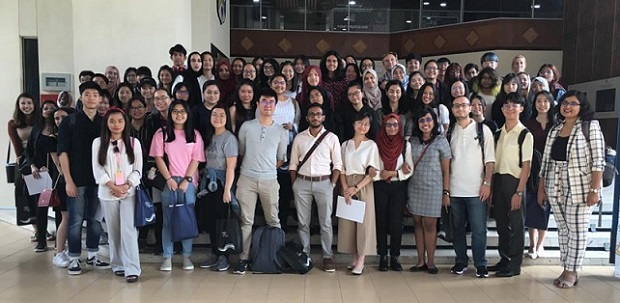
November 18, 2019, by khyx2lyn
MAPSA Conference 2019
On 16 of November, the School of Psychology sent a delegation of nearly a hundred members comprising undergraduates, postgraduates and staff to the Malaysian Psychology Student Assembly (MAPSA) Conference at the National University of Malaysia (UKM), Bangi. The MAPSA Conference brings together student researchers in psychology, and is a platform for these students to present the experimental work they have done throughout their academic career. The University of Nottingham Malaysia (UNM) was the first host of the conference in 2011, then known as the Malaysian Psychology Conference.
This year, the theme of the conference was “Identifying and differentiating pseudo-psychology from psychology”. The conference was opened with a series of speeches from various luminaries in the Malaysian psychology scene. First, Dr Rozainee Khairudin, president of the Malaysian Psychological Association (PSIMA) and Associate Professor in the Faculty of Social Sciences and Humanities of UKM talked about what pseudo-psychology is and why it is popular in the general public. She urged participants to take an active stand against pseudo-psychology and to combat it where it is found. Next, Dr Suzana Mohd Hoesni from UKM touched briefly on the purposes of MAPSA as a social event and officiated the conference.
The keynote speech was given by Associate Professor Dr Rachel Pye from the University of Reading, who talked about her work in Malaysia and interests in the field of literacy and dyslexia. She stressed the importance for children to achieve not only verbal fluency but also literacy in a language, as well as some of the challenges presented when assessing language proficiency across different cultures, in multilingual as well as clinical populations, and how to determine which interventions would be suitable to administer to these populations. She noted that many interventions claim validity based on pseudo-psychological practices and this complicates the process for both parents and clinicians to find a suitable intervention for an affected child.
The plenary session after the keynote speech was chaired by Dr Rozainee and the plenum speech was given by Assistant Professor Dr Marieke de Vries from UNM. Dr Marieke discussed about the rising number of diagnoses of autism worldwide, noting that it could be caused from among several factors such as the revision of diagnostic criteria in official diagnoses manuals and data collection for outpatients, genetic factors, over-diagnosis, or increasing cognitive demands placed by a modern society. She highlighted the infamous Wakefield study that claimed to have found a causal link between giving children MMR vaccines and autism as an example of a far-reaching pseudo-psychological study. She also noted similarities between findings causes and finding treatments for autism, as desperate parents would seek out available and seemingly valid treatments in lieu of finding scientifically sound and proven treatments for their child.
After the speeches, the conference participants adjourned to the parallel session where both the oral and poster presentations were conducted simultaneously. A group of seven postgraduate and undergraduate students participated in eight out of the thirty-four oral presentations, while another group of eight students presented their posters in a field of twelve submissions. The oral and poster presentations showcased various research piloted, conducted, or still ongoing in the School of Psychology, ranging from psychophysical experiments to personality assessments. One of the undergraduate students presenting her poster on her study about the effect of head orientation on social attention, Archana Pandurangan, not only found the breadth of topics covered in the other studies fascinating, but also was surprised by the number of people taking an interest in her study. Although she was in neck and neck competition with the eventual winner of the Best Poster Award, she found the experience thrilling and said that the voting system motivated her to do her best in explaining her study to participants.
Before the end of the day, a brief forum session was conducted to answer questions polled from the participants throughout the day. Associate Professor Dr Steve Janssen, also from UNM, and Dr Marieke were on the panel alongside other academics from various schools and answered questions on wide-ranging topics such as the legalisation of marijuana, if religion is a form of pseudo-psychology, and issues arising when diagnosing a developmental disorder in a student in a school setting.
The delegation was certainly grateful to be part of this exciting event, and were enlightened by the various ideas and topics presented. We look forward to attending next year’s MAPSA conference!
This piece is reported by Markus Loke, laboratory technician for the School of Psychology.
-
Post a comment


